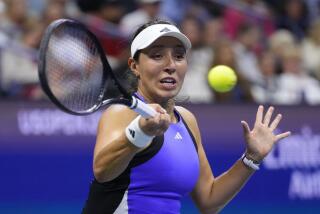Centre of Attention
- Share via
After two weeks of stops and starts, skidding and sliding, rain occasionally interrupted by sunshine, the grass at Centre Court of the All England Club is just about worn out.
Sparse in some spots, invisible in others, scuffed at the service line, beat up at the base line, it still provides the setting for great tennis theater, the finals of the fortnight, the Wimbledon Championship.
It is Grand Slam tennis on its most glorious stage.
In 115 years of the competition on the outskirts of London, no woman has dominated that cathedral of tennis more thoroughly than Martina Navratilova, who won nine singles championships there.
Navratilova ruled Centre Court majestically, a master of the grass who scooped up some blades as a keepsake after her last final there in 1994. She won Wimbledon in 1978 and 1979, then every year from 1982 through 1987, and once more in 1990.
Five times, her victim was old pal Chris Evert, her longtime rival in one of the great sports soap operas this century.
“It was special because she had her following and I had mine,” said Evert, at Wimbledon for NBC. “They were different groups. Her fans appreciated what she stood for and my fans appreciated what I stood for. It was about how we looked, how we acted, our style, where we came from.”
Navratilova and Evert faced each other 80 times during their careers, with Martina holding a 43-37 edge. Nine times, the setting was Wimbledon and five of those were in the finals. They split four semifinals, Evert winning in 1976 and 1980, Navratilova in 1987 and 1988.
But each time they played with the Wimbledon championship at stake--1978, 1979, 1982, 1984 and 1985--Navratilova prevailed.
“It was sort of a given that I would play her,” said Navratilova, who now broadcasts the event for HBO.
And so, Martina planned for their matches, knowing that sooner or later, Evert would show up on the other side of the net.
Once, though, that strategy backfired.
In 1986, Evert and Navratilova seemed headed to a third straight showdown. Certainly, Martina thought so. But a funny thing happened on the way to the final.
Hana Mandlikova beat Evert in the semifinals, leaving Navratilova surprised, tosay the least.
“I had geared up for Chris for two weeks,” she said. “When she lost to Hana, it threw me. Now I had to change tactics from practicing chips and charges and long baselines. Suddenly, I had a serve-and-volleyer on my hands.
“You prepare for Chris and two days before, it’s a total U-turn.”
Navratilova took a deep breath and adjusted her plans, beating Mandlikova 7-6, 6-3 for the championship.
“I wound up winning and that’s what counts,” she said. “But it taught me a lesson about planning for an opponent.”
Evert won this event three times -- never, however, when Navratilova was on the other side of the net.
“I was always at a disadvantage there,” she said. “Elsewhere, I felt it was 50-50. But there, with the grass, that was her best surface and my least effective. I always felt I was swimming uphill against the tide there.”
Still, she appreciated the significance of the matches and the setting.
“I always got excited,” she said. “The adrenaline was flowing. I knew every part of my game had to be on. The grass created more pressure on my game.”
Evert treasures the memories and the matches she played there.
“Wimbledon to me transcends tennis,” she said. “The English know how to do occasions, whether it’s a royal wedding or Ascot or Wimbledon. You sense the ghosts that have played there. It’s the only grass around. The rivalry with Martina made it more special.”
As well as she played on grass, Navratilova said Wimbledon’s lawns did not make Evert an easy opponent.
“I was better against her on other surfaces,” she said. “It was hard to create much against her on grass. On a surface with a high bounce, I did better. She knew it was easier for me to serve and volley. Her ball was low and deep, easier to attack on a slower court. It was more difficult for her to hit a passing shot.”
Because of that, perhaps, playing Evert at Wimbledon did not add that much to the rivalry for Navratilova.
“Playing Chris was special enough all by itself,” she said.
Once, early on in their careers, Evert and Navratilova played doubles together, a master of the baseline and a serve-and-volley expert in what seemed an almost unfair alliance. They won the French Open in 1975 and a year later took the Wimbledon championship.
Then they went their separate ways, destined to meet again in singles matches all over the tennis world, but rarely in one as regal as Wimbledon.
More to Read
Go beyond the scoreboard
Get the latest on L.A.'s teams in the daily Sports Report newsletter.
You may occasionally receive promotional content from the Los Angeles Times.










